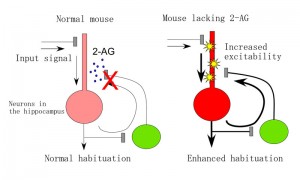A marijuana-like substance in the brain modulates habituation Elucidation of the mechanism underlying endocannabinoid modulation of habituation

Habituation is one of the simplest forms of learning and is reported to be impaired in patients with psychiatric disorders including schizophrenia and autism.

© Yuki Sugaya, In normal mice, the endocannabinoid 2-arachidonoylglycerol (2-AG) suppressed excitability of neuronal circuits and retards habituation (left). In mice lacking 2-AG production, excitability of the neural circuit is elevated and habituation is enhanced (right).
Assistant professor Yuki Sugaya and professor Masanobu Kano at the Department of Neurophysiology, the Graduate School of Medicine, the University of Tokyo, have elucidated, for the first time, how marijuana-like substances in the brain (endocannabinoids) modulate habituation to odor and space. Genetically engineered mice that exhibit significant reduction in one of the two major endocannabinoids, 2-arachidonoylglycerol, showed faster habituation to odor and space. The neural circuits of the mice had enhanced excitability and increased tendency to undergo potentiation of transmission efficacy at synapses, the structures through which electrical signals are transmitted between nerve cells. Furthermore, the researchers demonstrated that enhanced excitability and increased synaptic potentiation in the dentate gyrus of the hippocampus cause faster habituation in these mice.
Endocannabinoid signaling is related to psychiatric disorders such as schizophrenia, autism and addiction, in which habituation is often impaired. Results in the present study may help understand the mechanisms underlying the impairment of habituation and learning in patients with these psychiatric disorders.
This work has been supported by Grants-in-Aid for Scientific Research and the Strategic Research Program for Brain Sciences (Development of biomarker candidates for social behavior) from MEXT, Japan.
Press release [PDF] (Japanese)
Paper
Yuki Sugaya, Barbara Cagniard, Maya Yamazaki, Kenji Sakimura, Masanobu Kano,
“The Endocannabinoid 2-Arachidonoylglycerol Negatively Regulates Habituation by Suppressing Excitatory Recurrent Network Activity and Reducing Long-Term Potentiation in the Dentate Gyrus”,
The Journal of Neuroscience 33/Vol 8 (2013): 3588-3601, doi: 10.1523/JNEUROSCI.3141-12.2013.
Article link
Links
Department of Neurophysiology, Division of Functional Biology, Graduate School of Medicine







